Eight project agreements were signed on the margins of the Green Climate Fund’s 40th Board meeting (B.40), which took place on 21-24 October 2024 in Incheon, Republic of Korea.
At the last Board meeting of the year, B.40, USD 1 billion in GCF funding for 16 projects was approved. GCF’s portfolio now comprises 286 projects across 133 countries, with a total GCF investment of USD 16 billion and an overall total of USD 61.5 billion with co-financing.
Before a project can launch, the project agreement or Funded Activity Agreement (FAA) must be negotiated and signed by GCF and the AE. The FAA contains a set of conditions to be fulfilled by the AE, which can be a lengthy process. As part of GCF’s agenda to increase its efficiency and impact, the Fund has been making efforts to speed up processes to deliver projects to communities more quickly.
Among the 16 projects, agreements for eight were immediately signed between GCF and its Accredited Entity partners at a signing ceremony on 24 October, one day after Board approval.
These include a project in Burundi, the first to be developed under the Project-Specific Assessment Approach (PSAA), and GCF’s first single-country projects in Azerbaijan, Iraq, and Somalia. Projects in Ethiopia and Rwanda continue to strengthen GCF’s programming in these countries, while a climate health project in Malawi and a climate resilience multi-country programme in West Africa extend the reach of GCF programming to vulnerable populations.
Notably, the projects in Burundi and Somalia moved from Board approval to project signing to first disbursement in one day, marking another record for GCF for rapid implementation this year. Projects in Bhutan, Malawi and the Cook Islands were rapidly turned around, ranging from a day for Bhutan, seven days for Malawi and 20 days for the Cook Islands, from Board approval to project signing to disbursement.
For more information about the projects, please click here.
SAP045 Scaling up Climate Resilience Solutions for Burundian Smallholders with One Acre Fund Burundi
Burundi’s smallholder farmers face escalating climate vulnerability and food insecurity. The country is dependent on rain-fed agriculture, and yields remain low. Multiple climate hazards erode productivity gains and disrupt livelihoods. To address these challenges, the project aims to enhance smallholder farmers' adaptive capacity. It will focus on scaling up a proven model of capacity-building support in agroforestry and livelihood diversification, which will allow farmers to graduate from subsistence agriculture, diversify their activities, and enable better access to markets. It is the first project under Project-Specific Assessment Approach (PSAA) that aims to streamline and broaden access to GCF finance for new partners, countries, and technologies.
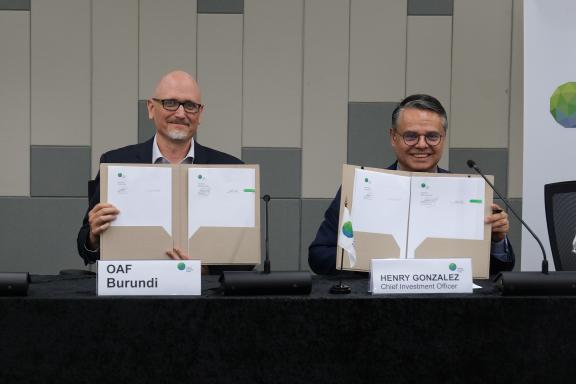
SAP046 Strengthening Climate Information and Multi-Hazard Early Warning Systems for Increased Resilience in Azerbaijan with United Nations Environment Programme (UNEP)
The project aims to foster effective early warning communication, disaster preparedness and anticipatory action in Azerbaijan. It will raise awareness and understanding of climate hazards and risks and enhance national capability to coordinate and collect data and generate and deliver timely and reliable climate information and early warnings. The project will support the country in developing a weather forecasting and warning production process and system. This will enable efficient and timely dissemination of information to increase risk knowledge and improve the population's disaster preparedness and response capabilities.
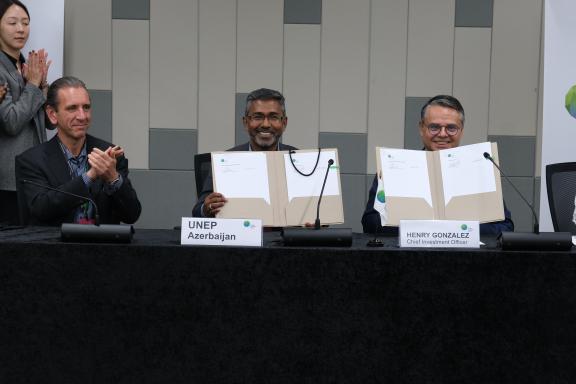
FP243 Climate-resilient community access to safe water powered by renewable energy in drought-vulnerable regions of Ethiopia with Ministry of Finance and Economic Cooperation of the Federal Democratic Republic of Ethiopia (MOFEC)
Ethiopia’s drought-prone regions face mounting challenges due to climate change. The project will implement solar-powered water pumping systems with efficient irrigation techniques to address these issues. It will also empower smallholder farmers and pastoralists to adopt sustainable agricultural practices. Recoverable grants will enhance access to finance, improve water security and boost agricultural and livestock productivity. The initiative aims to foster sustainable water usage practices nationwide, demonstrate a community-led water management model that integrates traditional techniques, and strengthen local institutional capacity to scale the deployment of clean energy solutions.
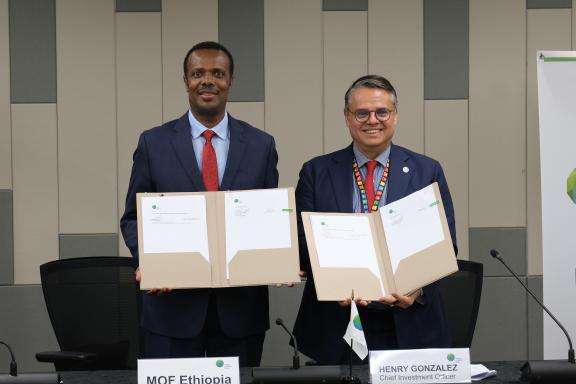
FP244 Climate Resilient Health and Well-Being for Rural Communities in southern Malawi (CHWBRC) with Save the Children Australia
Malawi is among the most climate-vulnerable countries in the world, exposed to increasing temperatures, changing rainfall patterns, and extreme weather events. These result in a range of health-related impacts. The project will adopt a holistic climate-informed approach to strengthening Malawi’s health system and reducing the adverse effects of climate change on the health and well-being of the population. It will strengthen and disseminate climate-informed health surveillance and early warning systems at the national level and strengthen the resilience of health, water and sanitation infrastructure. It will also develop and apply national standards and guidelines for climate-resilient facilities, and healthcare staff will be trained to reduce climate-related health risks.
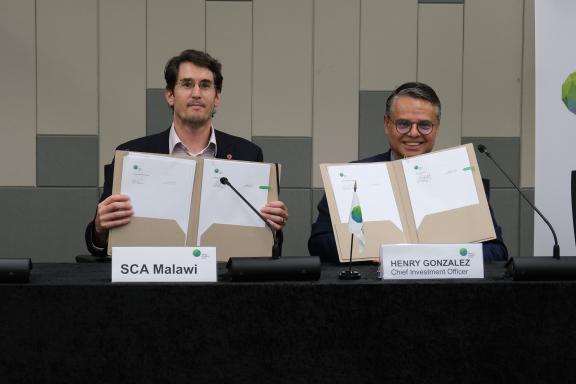
FP245 Green City Kigali: a new model for urban development in Rwanda with Ministry of Environment of Rwanda
As Rwanda urbanises rapidly, it faces significant climate variability, leading to increased heat and more erratic and heavy precipitation, resulting in devastating floods and landslides in informal peri-urban expansion areas around Kigali. The Green City Kigali Masterplan for Kinyinya Hill sets out a complete settlement with climate risk-reducing infrastructure and decentralised low-carbon basic services. On-site vocational training will enable the community to upskill and partake in the green transformation. This project will allow Rwanda to implement this changing paradigm and invest comprehensively in climate-compatible upgrading. This will build climate resilience for the community and make flooding, landslides, and loss of livelihoods and lives a thing of the past.
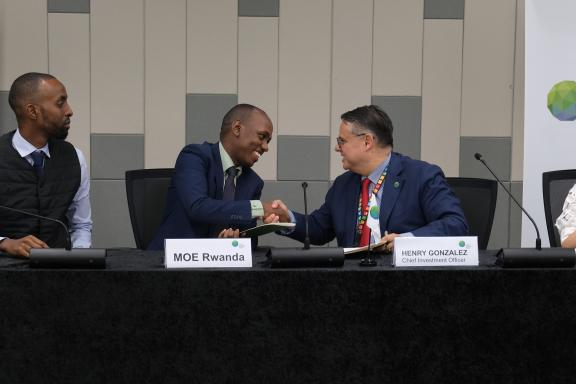
FP246 Climate Resilient Agriculture in Somalia (Ugbaad) with Food and Agriculture Organization of the United Nations (FAO)
Somalia is one of the most fragile countries in the world. It faces significant challenges regarding security, inequality, displacement, conflicts over natural resources and economic development, all of which are exacerbated by climate change. Climate change increases the likelihood of compounding and cascading impacts for communities and ecosystems in a post-conflict context. The project aims to restore productive landscapes to sustain resilient livelihoods. It will promote sustainable agricultural practices and increased access to water; enhance access to climate-resilient inputs; improve market access for smallholders; and strengthen institutional frameworks and coordination for sustainable landscape management and climate-resilient agriculture.
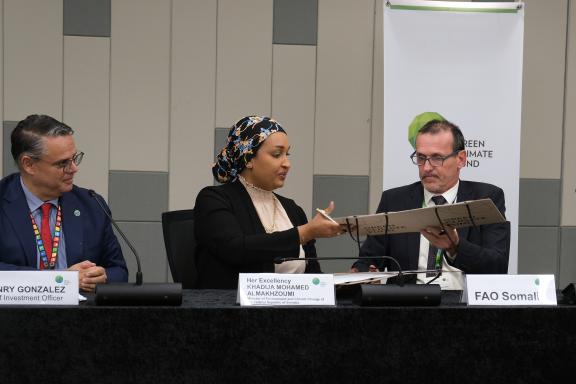
FP247 Local Climate Adaptive Living Facility Plus (LoCAL+) – West Africa (Burkina Faso, Ivory Coast, Mali and Niger) with Banque Ouest Africaine de Développement (West African Development Bank, BOAD)
West Africa is one of the most vulnerable regions in the world, with crippling agricultural losses, recurrent food crises, water scarcity and extreme flooding, and environmental degradation from multiple climate hazards. The project aims to enhance adaptive capacities and knowledge and promote the adoption of climate-responsive practices and innovative financing mechanisms among local governments, communities and enterprises. It will promote the integration of climate resilience into local governments’ annual planning and budgetary cycles; build the capacity of local governments, communities and enterprises to develop and implement climate change adaptation plans; and support the development of blended financing facilities for local enterprises.

FP249 Strengthening Climate Resilience of Vulnerable Agriculture Livelihoods in Iraq (SRVALI) with Food and Agriculture Organization of the United Nations (FAO)
Iraq faces critical climate hazards such as rising temperatures, prolonged droughts, and reduced water availability from the Euphrates and Tigris rivers. Local farming communities in the governorates of Najaf, Karbala, and Muthanna are particularly vulnerable due to their dependence on irrigation and limited adaptive capacity. The project aims to strengthen the climate resilience of vulnerable agricultural households, focusing on water efficiency through modern irrigation infrastructure and the empowerment of Water User Associations (WUAs), promoting climate-resilient agricultural practices, and supporting the development of policies for water and energy management and renewable energy systems such as solar-powered irrigation. The project will also promote gender equity by empowering women as change agents, fostering inclusive and sustainable community development.